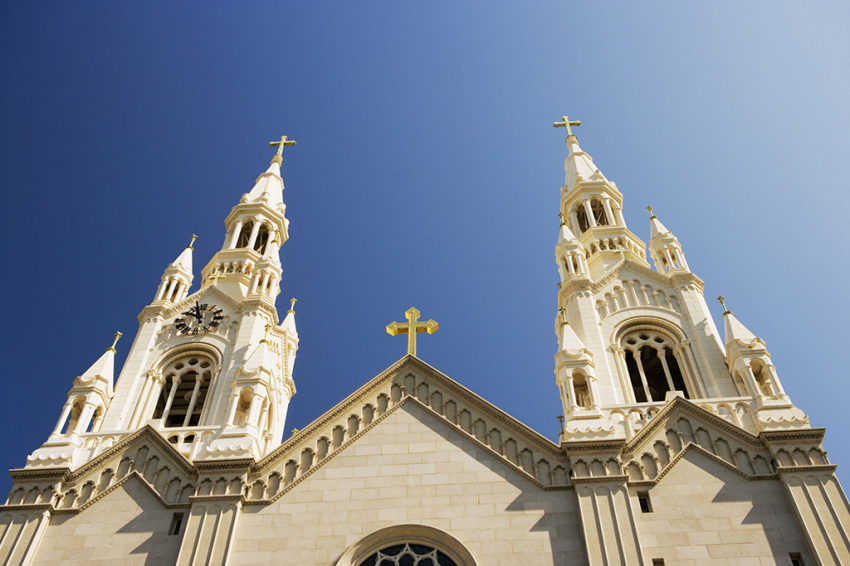Catholic Church amassed billions in PPP aid despite having billions of own money: report

Catholic churches and their related institutions amassed at least $1.5 billion in funding from the government’s Paycheck Protection Program while sitting on billions of dollars of their own money, a new Associated Press investigation has found.
The PPP was designed to provide a direct incentive for small businesses, including faith-based organizations and other nonprofits, to keep their workers on the payroll as the coronavirus pandemic ravaged the economy. If all employees are kept on the payroll for eight weeks and the money is used for payroll, rent, mortgage interest, or utilities, these loans, which are administered by banks and other federally insured depository institutions, will be forgiven.
Evidence highlighted by the AP suggested, however, that many Catholic churches and their related institutions, which enjoyed some of the highest approval for government funds during the pandemic, received taxpayer aid despite not experiencing financial hardships.
While collecting at least $1.5 billion in government funds through the program, the investigation showed that Catholic churches and their related institutions were sitting on more than $10 billion of their own funds. And instead of taking hits to their coffers as many small businesses were forced to do amid the pandemic, many saw their wealth increase.
The AP analysis shows that overall, the nation’s nearly 200 dioceses, where bishops and cardinals govern, and other Catholic institutions received at least $3 billion, making them perhaps the biggest beneficiary of PPP funds.
And one of the reasons Catholic Church operations was able to collect so much money from the program was through special treatment. After Congress allowed nonprofits and religious organizations to participate in the PPP, Catholic officials further lobbied the Trump administration to be exempted from the affiliation rule that disqualifies applicants with more than 500 workers.
“Without that break, many dioceses would have missed out because — between their head offices, parishes, schools and other affiliates — their employee count would exceed the limit,” the AP report said.
This exemption allowed the Catholic Church to collect about the same amount of funds as the combined total collected by the other top five religious groups in the program — Baptist, Lutheran, Methodist and Jewish operations.
“So many Catholic entities received help that reporters could not identify them all, even after spending hundreds of hours hand-checking tens of thousands of records in federal data,” the AP report said.
The Rev. James Connell, an accountant for 15 years before joining the priesthood and becoming an administrator in the Milwaukee Archdiocese who is also a retired canon lawyer, said the AP’s findings show that the Catholic entities did not need government funding particularly when thousands of small businesses were forced to close.
“Was it want or need?” he asked. “Need must be present, not simply the want. Justice and love of neighbor must include the common good.”
One pastor in a Western state told AP that even though diocesan officials repeatedly pressed him to apply for the funds, he refused. One high-ranking official even questioned why he was “leaving free money on the table” but the pastor who spoke on condition of anonymity said he felt a “sound moral conviction” that the money was meant more for shops and restaurants that, without it, might close forever.
“We didn’t need it,” the pastor said, “and intentionally wanted to leave the money for those small business owners who did.”
Last April, leaders of black churches nationwide raised concern that they were being shut out of accessing financial assistance under the Small Business Administration’s Paycheck Protection Program even as other churches appeared to be getting help, the NAACP said.
"We have representation from all of our nine major African American denominations," Derrick Johnson, president and CEO of the NAACP, said in an NPR report. "Most of them have complained about the lack of responsiveness from the banks to which they have submitted applications. These are churches from San Francisco to Detroit to Florida to Connecticut. We hear a consistent concern from church leaderships across the country."
The Rev. James Perkins, pastor of Greater Christ Baptist Church in Detroit, which has a predominantly African American congregation, said because he received no help, he was forced to lay off most of his church’s nine employees while others had to take salary cuts.
"I haven't taken any scientific survey, but a number of black pastors with whom I have relationships in Detroit are concerned because they did not receive funding [too]," Perkins said.
The Christian Post reached out to the United States Conference of Catholic Bishops about the report Thursday and a response is still pending. Conference spokeswoman Chieko Noguchi told the AP in a statement that the PPP was “designed to protect the jobs of Americans from all walks of life, regardless of whether they work for for-profit or nonprofit employers, faith-based or secular.”
Congress initially pumped $659 billion into the PPP last spring and an additional $284 billion in December. Changes were also made to the requirements to ensure only businesses that lost money would get help while the size of those businesses must now be 300 or fewer employees.



























